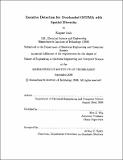| dc.contributor.advisor | Moe Z Win. | en_US |
| dc.contributor.author | Baik, Eugene | en_US |
| dc.contributor.other | Massachusetts Institute of Technology. Dept. of Electrical Engineering and Computer Science. | en_US |
| dc.date.accessioned | 2008-04-23T14:36:01Z | |
| dc.date.available | 2008-04-23T14:36:01Z | |
| dc.date.copyright | 2006 | en_US |
| dc.date.issued | 2006 | en_US |
| dc.identifier.uri | http://hdl.handle.net/1721.1/41254 | |
| dc.description | Thesis (M. Eng.)--Massachusetts Institute of Technology, Dept. of Electrical Engineering and Computer Science, 2006. | en_US |
| dc.description | Includes bibliographical references (leaves 81-85). | en_US |
| dc.description.abstract | Orthogonal Frequency Division Multiple Access (OFDMA) systems have built-in mechanisms to mitigate the effects of the wireless multipath channel but are limited in system capacity to available bandwidth. This shortcoming can be worked around through the process of "overloading," where users are additionally multiplexed in the spatial domain to each frequency resource. To efficiently resolve non-orthogonally multiplexed users within the system, sophisticated multiple antenna receivers with multiuser detection methods are necessary. The focus of this thesis will be the formulation of an iterative multiple antenna receiver framework for overloaded uplink OFDMA systems. Specifically, we formulate optimal MAP and reduced complexity MMSE symbol detection algorithms for the multiuser detection and single user decoding turbo loop. We verify the performance of each algorithm through Monte Carlo simulation with randomly generated multipath MIMO channels. From the results we determine the tradeoffs of algorithm complexity with performance and the effect of channel correlation on the supportable user load. Our MMSE algorithm with soft interference cancellation is observed to closely approach single user performance in low to moderately correlated MIMO channels after turbo loop iteration. Additionally, we observe that increasing the number of antennas relative to the number of overloaded users can mitigate the effects of moderate correlation to provide acceptable error performance. | en_US |
| dc.description.statementofresponsibility | by Eugene Baik. | en_US |
| dc.format.extent | 85 leaves | en_US |
| dc.language.iso | eng | en_US |
| dc.publisher | Massachusetts Institute of Technology | en_US |
| dc.rights | M.I.T. theses are protected by
copyright. They may be viewed from this source for any purpose, but
reproduction or distribution in any format is prohibited without written
permission. See provided URL for inquiries about permission. | en_US |
| dc.rights.uri | http://dspace.mit.edu/handle/1721.1/7582 | en_US |
| dc.subject | Electrical Engineering and Computer Science. | en_US |
| dc.title | Iterative detection for overloaded OFDMA with spatial diversity | en_US |
| dc.title.alternative | Iterative detection for overloaded Orthogonal Frequency Division Multiple Access with spatial diversity | en_US |
| dc.type | Thesis | en_US |
| dc.description.degree | M.Eng. | en_US |
| dc.contributor.department | Massachusetts Institute of Technology. Department of Electrical Engineering and Computer Science | |
| dc.identifier.oclc | 213396332 | en_US |
